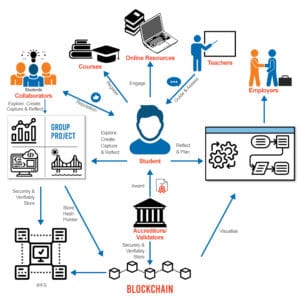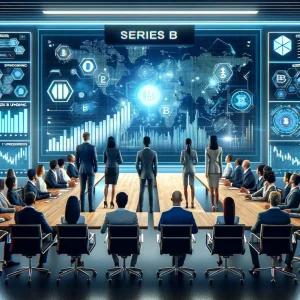Blockchain uses in education – this realization could be the hard lesson we need to learn from Covid-19.
Like a gigantic bird of prey, this pandemic has swooped down on the unwary school populace and tore down the fragile structure of tottering traditional school systems in most countries. Thus, inevitably, the need for a blockchain-based educational system is being revealed.
Not only for schools, but blockchain-based education has also been on the agenda of most higher education institutions for those in need of upskilling and educational programs that will help them further their career.
Upgrading the education system has long been on the drawing board but rescheduled due to budget constraints and resistance by the educators themselves who lack the qualification for the technology.
How will education change for the better – or the worse – in the long term? We believe blockchain can play a positive role in an online education future. Let’s see how a child will react to a world with little or no access to educational tools. How does she make her way from devastation to gain the fullest blockchain uses?
Blockchain Babe’s Diary
Dear Diary
The world has changed, since yesterday. There are so many confusing thoughts going through my mind…
- I can’t go to school anymore, not because I don’t want to, I do, but because my school has closed. Thank goodness homeschooling is legal in India…but if it wasn’t would they suddenly legalize online education and how would I access it?
- The COVID-19 pandemic has changed how millions of my fellow students around the globe are educated.
- Every day I hear new reports of coronavirus spreading rapidly across Asia, Europe, the Middle East, and the United States, and schools closing.
- I am so happy I am able to access my education online…but what about the millions of students who can’t and are now stranded in an educational “no man’s land”
My Pita-ji tried to explain it all to me, but all I want is to be normal and travel and make friends and have fun. Will it ever be the same as it was?
In a matter of weeks, the coronavirus (COVID-19) has impacted global thinking on education. No public gatherings over a certain number of people, social distancing and self-isolation, has suspended attendance at schools and universities. The OECD estimated that on March 13 that over 421 million children have been affected due to school closures in 39 countries. An additional 22 countries have implemented partial “localized” closures.
Blockchain uses in education long overdue
This shift in global thinking has prompted new examples of innovation in education, with millions of students in China, South Korea, Italy, and Iran in “homeschooling” situations. How about blockchain benefits in education?
English Forward believes a radical revamp of the education system needs to be addressed to ensure that there is inclusion for all students globally through this process. It’s reasonable to assume that COVID-19, and the decisions made as a result of the virus, could spawn radical change and have a lasting impact on the trajectory of learning innovation and digitization. Could this be the time blockchain finds its place in education?
Diary…I’ve heard of so many great solutions in different countries
In Hong Kong students have started to learn at home, via interactive apps.
120 million Chinese students got access to learning material through live television broadcasts.
A Nigerian school online used learning via Google Classroom and supplemented it with face-to-face video instruction.
In Lebanon students submitted homework via video, learning how to shoot a video and video editing in the process.
The ‘learning anywhere, anytime’ and “lifetime learners” is simple as 5G technology becomes more accessible in countries such as China, US, and Japan, which have access to digital tools and good access to wifi and data.
What of the less developed countries? How do the students in those places keep up with global trends unless there are a real focus and urgency for equal education for all? Given the digital divide, new shifts in education approaches could widen equality gaps, not improve it. Blockchain is the equalizing factor.
The relevance of public-private educational partnerships will grow in importance as governments, publishers, education professionals, technology providers, and telecom network operators need to prioritize these partnerships to achieve a level educational playing field.
Could this be the catalyst for change in countries where education has predominantly been provided by the government, and how will this happen? What are the opportunities and threats to inclusion?
A long-term cost-effective, self-funding solution
Presently, only around 60% of the world’s population is Prohibitiveonline. For Hong Kong students, digital classes on tablets are very normal, but this concept is very foreign in Somalia where some students rely on lessons sent via WhatsApp or email.
The children in affluent families have a distinct advantage because of the cost of digital devices and data plans.
Unless access costs decrease and the quality of access is improved globally, the widening gap in quality education will grow, resulting in many being left behind. A long-term cost-effective, self-funding solution is vital to sustained growth and inclusion, and a blockchain educational platform ticks these boxes.
The global impact of COVID-19 has highlighted the importance of building educational tools and systems able to withstand various threats, from pandemic disease to extremist violence to geographical displacement and the changing technological classroom.
The pandemic is an opportunity for us to build systems with the predictability and reliability students need in this unpredictable world. Blockchain supports and allows many a simple implementation of many of these concepts and ideas, and gives students in a constantly more connected world the tools to thrive.
Knowledge of blockchain uses in education
A year ago, blockchain uses in education has gained considerable attention from researchers and practitioners. This is mainly due to its unique features including decentralization, security, reliability, and data integrity. Despite this growing interest, little is known about the current state of knowledge and practice regarding the use of blockchain technology in education.
Here are some popular blockchain uses in education:

My team and I have been building towards the future with the help of our strong community, but we need more help from networked communities willing to collaborate with us. The possibilities are as endless as the problems we are seeking answers for. What are the best ways of applying blockchain uses in education?
Barriers to technological innovations for supporting education include inadequate telecommunications bandwidth, lack of trained support staff, and the cost and the availability of simple telephones, cell phones, computers, and electricity.
Problems being asked by all stakeholders:
- What processes are needed to provide electricity and broadband access for all educational institutions (e.g. schools, colleges, universities);
- What processes are needed to provide broadband access to all lifelong learners (adults who can pay reasonable rates for access);
- What alternatives do institutions have if they are unlikely to be connected to reliable electricity service in the foreseeable future;
- What alternatives are there for introducing computers or increasing their numbers in schools and institutions of higher learning; and
- If computers are to be installed in institutions, what processes are underway to ensure full training and support for teachers and learners to effectively integrate these into the teaching, learning and school management processes?
- What are the innovations in education that can help meet the three-billion people challenge?
The choices we make today will secure the future of an online education system available for all tomorrow. Would you like to know more about blockchain uses in education? Where do you stand in this spectrum?





